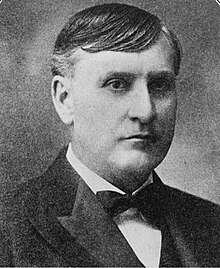Albert E. Mead
Albert E. Mead (born December 14, 1861 in Manhattan , Riley County , Kansas , † March 19, 1913 ) was an American politician and from 1905 to 1909 the fifth governor of the state of Washington .
Early years
Meade attended after elementary school, the Southern Illinois Normal University and then studied at the College Union law . After being admitted to the bar, he initially practiced his new profession in Wichita . In 1889 he moved to Blaine, Washington state. He soon became politically active in his new home. First he became mayor of Blaine. Then he was elected to the Washington House of Representatives. He was also a District Attorney in Whatcom County . In 1905 he was elected as a Republican candidate for new governor. He owed the choice mainly to the Great Northern Railroad , which had campaigned for him within the Republican Party. Added to this was the republicans' dissatisfaction with their own then-incumbent Governor Henry McBride . He had created too many enemies both in the railroad company and in his party to be nominated again for the first state office.
Washington governor
Mead began his four-year term on January 9, 1905. During his tenure, however, he particularly disappointed the railways. Instead of the hoped-for benefits, she had to accept higher taxation. Like his predecessor, Mead also supported the Railway Committee. Against the background of the emerging automobile traffic, a separate Highway Commission was founded to take care of the expansion of the traffic routes. Other new government departments such as a State Tax Commission and a Bank Examiner have been set up. In 1905, under the so-called Dawes Act, further former Indian land was opened to white settlers. During Mead's tenure, Washington State introduced the principle of pre-election in public elections, which is essentially still in use today.
Another résumé
After Mead had not received his party's nomination for a second term in 1908 and was defeated in the primary elections he had introduced, he had to resign on January 27, 1909. After the end of his governorship, Mead retired to Bellingham, where he worked as a lawyer. There he was also president of the local chamber of commerce. Albert Mead died in March 1913. He was married twice and had a total of five children.
Web links
- Albert E. Mead in the database of the National Governors Association (English)
- The governors of Washington (English)
- Albert E. Mead in the database of Find a Grave (English)
| personal data | |
|---|---|
| SURNAME | Mead, Albert E. |
| BRIEF DESCRIPTION | American politician |
| DATE OF BIRTH | December 14, 1861 |
| PLACE OF BIRTH | Manhattan , Kansas |
| DATE OF DEATH | March 19, 1913 |

